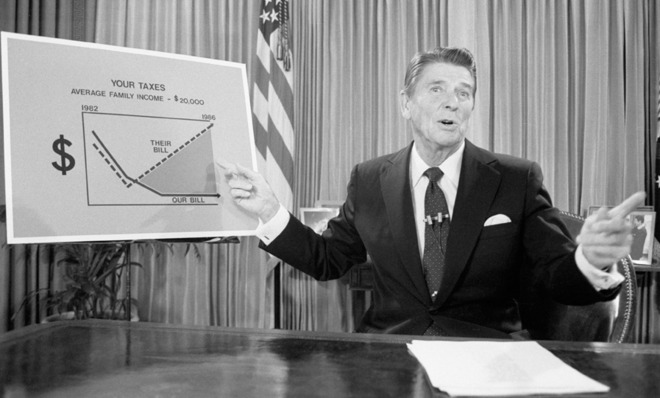Free markets need more regulation than you think
After all, they can't just magically appear out of nothing

I have always found it unfathomable that people think a "free market" means little to no regulation. Yet since the days of Reaganomics, an increasingly large number of economic thinkers have made exactly that case, to the extent that deregulated markets have become Republican orthodoxy. What is so mind-boggling is that the policies they champion have little to do with the intellectual heritage they invoke.
Proponents of deregulated markets say their cause was born from the idea that millions of people acting freely in the marketplace make more efficient decisions consistently than any group of Wise Men appointed by government can. In this world, humans are rational actors pursuing rational ends and the competition between them is a better regulator than any government official. The market simply rejects the businesses who do not offer a good service, while rewarding those who do.
These laissez-faire attitudes are encapsulated in a quote from Reagan himself: "The nine most terrifying words in the English language are: 'I'm from the government and I'm here to help.'" The implication is clear — government regulators and bureaucrats come in, misunderstand the market, and just get in the way of entrepreneurs. At best, it is argued, this hurts efficiency. At worst, it is a road to totalitarianism, where the government completely squashes economic and political freedom.
The Week
Escape your echo chamber. Get the facts behind the news, plus analysis from multiple perspectives.

Sign up for The Week's Free Newsletters
From our morning news briefing to a weekly Good News Newsletter, get the best of The Week delivered directly to your inbox.
From our morning news briefing to a weekly Good News Newsletter, get the best of The Week delivered directly to your inbox.
Friedrich Hayek's The Road to Serfdom is a book frequently cited by many who see government regulation as a slippery slope toward totalitarianism. Yet Hayek himself was more pragmatic about regulation than the title of his book implies, condemning a "wooden insistence" on "laissez-faire" as harmful to the cause of economic freedom.
Advocates of laissez-faire and deregulation generally argue that government's regulatory role is the prevention of violent coercion, fraud, and theft, as well as the enforcement of property rights and contracts, and little more. In other words, it should act as the night-watchman state. Some — such as the anarcho-capitalist followers of Murray Rothbard — go further and argue that it is beneficial for even these functions to be taken over by the market.
Yet Hayek pointed to a number of areas where he considered regulation beneficial — and the list may shock advocates of laissez-faire economics. Hayek cited the restriction of excessive working hours, the maintenance of sanitary conditions, and the control of poisonous substances. He argued that regulation by the market became ineffective when property owners weren’t charged for the damages they caused, and thus saw a need to regulate deforestation, farming, and the smoke and noise produced by factories.
So what "road to serfdom" was Hayek talking about if he favored government regulation in many areas? He was actually describing central economic planning, where the government takes over the process of allocating resources, setting prices, and directing economic activity entirely. In other words, Hayek warned of states like Soviet Russia, Cuba, and North Korea. And if we look at the lack of political and economic freedoms in a country like North Korea, it is clear that Hayek was at least partially right.
A free daily email with the biggest news stories of the day – and the best features from TheWeek.com
But the key thing that Hayek grasped that many modern advocates of laissez faire don't is that government regulation of markets is not the same thing and not even close to being the same thing as full-on central economic planning.
In fact, I'd go even further and argue that the existence of a free market where individuals can freely pursue their economic desires and enjoy the fruits of their labor is a product of freedoms secured through government regulation. A free market isn't something that just magically appears out of nothing. It is a complex system born out of the context of a whole framework of legal, social, and political conventions that allow for the development of individuals who are capable of making the discerning economic and social decisions required for the functioning of a free market.
Beyond the basic freedoms of the night-watchman state — secure property rights, freedom from coercive violence, freedom of movement, freedom of association — a genuinely free market requires regulation to secure other freedoms as well, like the freedom from being tricked by misleading advertising or from being poisoned by dangerous chemicals. I would also suggest that the following are equally important to the creation of a free and healthy marketplace: freedom from starvation; freedom from dying from easily curable diseases; freedom from environmental degradation caused by pollution; and the freedom to develop yourself as a person through education. After all, it is no coincidence that the market economy only really began to develop when the modern democratic state did too.
John Aziz is the economics and business correspondent at TheWeek.com. He is also an associate editor at Pieria.co.uk. Previously his work has appeared on Business Insider, Zero Hedge, and Noahpinion.
-
 Gabbard faces questions on vote raid, secret complaint
Gabbard faces questions on vote raid, secret complaintSpeed Read This comes as Trump has pushed Republicans to ‘take over’ voting
-
 Which way will Trump go on Iran?
Which way will Trump go on Iran?Today’s Big Question Diplomatic talks set to be held in Turkey on Friday, but failure to reach an agreement could have ‘terrible’ global ramifications
-
 High Court action over Cape Verde tourist deaths
High Court action over Cape Verde tourist deathsThe Explainer Holidaymakers sue TUI after gastric illness outbreaks linked to six British deaths